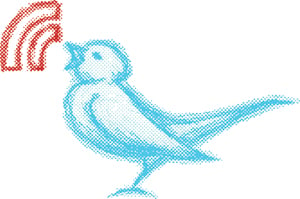Opportunity tweets
Dave Moutrey shows how our attitudes towards digital opportunities have changed – and finds that some areas are moving faster than others.

I’m writing this on the train home after a Cultural Leadership Programme event where the culture spokesperson from each of the three main political parties spoke and answered questions about their party’s policies on arts and culture. I was not surprised that digital technologies, social media and new business models were hardly mentioned. By the time the ‘Shift Happens’ conference takes place in July, we will most probably have a new government after an election that will have been significantly influenced by conversations on social media. These media are now truly pervasive, even if many parts of the arts world have not cottoned on yet. The only time the politicians mentioned ‘digital’ was in connection with protecting intellectual property (IP). Shift was most definitely not happening and, on this showing, you couldn’t put a Rizla between their policies.
My reason for mentioning this is that politics, art and digital media have been in my mind a lot of late. Dr Aleks Krotoski, in her BBC Four programme ‘The Virtual Revolution’, spent some time looking at the role Twitter played in the political unrest in Iran. Huge numbers of Iranian people were able to communicate with the outside world when established, traditional or whatever-you-want-to-call it media found it virtually impossible to get anywhere near what was happening. Iran shut Twitter off, but a young hacker devised software to cloak Twitter and enable it to be used. If social media can destabilise a government, imagine what they could do to an arts organisation. See some of the online noise about the Institute of Contemporary Arts and you will get the idea.
THE INSIDE TRACK
Recently I have been following Professor Andy Miah’s writing and Twittering from the Winter Olympics in Vancouver. Essentially, there were three groups covering the games. There was the official media, accredited by the Olympic authorities. According to one journalist, there are very clear guidelines about what accredited journalists can and cannot cover. Ignore these guidelines and you may lose your accreditation. Then there was the ‘official unofficial media’ who were accredited and helped by the civic and state authorities to cover tourism, culture and the like. Finally, the ‘unofficial unofficial media’: these were the journalists and citizen journalists who organised themselves through social media to report the underbelly stories and basically say what they want. They organised themselves through True North Media House, a website with print-your-own media accreditation and self-help guides on all manner of related stuff. It is great – check it out. This was the first real ‘digital games’, and so there were many more voices out there reporting on what they saw and thought.
So, not only are huge numbers of the public who attend Olympic events doing their own thing to report on events online, but there is also a very organised alternative voice out there. If you are a host broadcaster paying millions of pounds for broadcast rights, this may not make you happy. This presents huge challenges for Olympic authorities who believe they have to protect media rights because they need the £2bn in sponsorship and broadcast fees to pay for the whole show. There were reports of the Olympic authorities asking for video to be taken down; they were ‘protecting’ their IP and image rights. There are also lots of sites asking for people to upload their photos of the Olympics, but they need to check out who then owns the rights to those pictures. Should arts organisations do the same when a mobile phone video taken at one of its venues finds its way on to Facebook? Should we protect our IP in the same way, or should we count the views of that video as audience in our annual return to our funders?
BIG BROTHER?
Dr Krotoski also touched on how, as a nation, we have sleep-walked into having a level of surveillance in our everyday lives that makes the Stasi look amateur. In the public domain we know that every transaction we make is monitored to provide data on our purchasing habits. All of our financial history is documented to provide a credit history and credit rating. The UK has 20% of the world’s CCTV cameras, more per head than anywhere else in the world, and if your venue is like mine then arts venues have a fair share of these. I could go on. In the not-so-public domain, we know that all our e-mails and phone calls are available for authorities to access. There is the alleged USA/UK/Australian/Canadian Echelon project that uses computers to monitor every e-mail sent and phone call made for key words. If you have a mobile phone your position is known at all times (probably even when it is switched off). Again, I could go on. Aldous Huxley was a prophet.
So, Shift has happened and not all of it was good. The digital revolution provides us with exciting opportunities both to create new art and reach new audiences. It also raises some significant questions for artists and audiences to debate. It would have been interesting for our politicians to have discussed some of these issues around IP, censorship and surveillance rather than spend their time fighting for the middle ground.
Join the Discussion
You must be logged in to post a comment.